Key Summary
- Canadian universities rank significantly higher globally, with the University of Toronto at #25 and McGill at #29 in QS 2025, while Ireland’s top Trinity College Dublin places at #87.
- Ireland provides more affordable education with undergraduate tuition from €9,000 to €26,000 annually and living costs of €1,000 to €1,500 monthly, versus Canada’s higher expenses.
- Canada offers an average post-graduation salary of CA$75,362 versus Ireland’s €33,383, with simpler permanent residency pathways requiring 5 years of legal residence.
Choosing between Canada and Ireland to study abroad might be difficult given the benefits of each. International students can select from a variety of popular study-abroad destinations, including the United States, the United Kingdom, Australia, Canada, Ireland, and others. So, should you go to Canada or Ireland? Given the increasing global popularity of both destinations as significant educational and employment hubs, the decision appears difficult. Ireland and Canada each have distinct characteristics and value propositions to offer seekers. In this blog, we will clear your doubts regarding Canada vs Ireland by comparing these two countries. Here’s a closer look at some of the factors that may aid you in selecting the best study-abroad destinations.
| Parameters | Canada | Ireland |
| Area | 9.985 Million KM² | 84,421 KM² |
| Currency | Canadian Dollar (CA$) | Euro (€) |
| Capital | Ottawa | Dublin |
| Total Higher Education Providers | 100+ | 22 |
| Total Indian Students Studying | 319,130 | 4,000 |
| Average Cost of Living | CA$15,000 – CA$20,000 Per Year | €1,000 – €1,500 Per Month |
| Average Cost of Studying | CA$7,000 – CA$35,000 Per Year | €12,000 Per Annum |
| Popular Job Sectors | Healthcare, Information Technology, Finance, and Education | Technology, Accounting and Finance, Construction, Creative Design, Web Development, Nursing, and Business Skills. |
| Permitted Part-Time Working Hours | 20 Hours Per Week. | Up To 40 Hours Per Week During Holidays and 20 hours Per Week During the School Year |
This Blog Includes:
Top Universities: Canada vs Ireland
Choosing the best universities is critical when deciding on a career. We have compiled a detailed list of the best universities in Canada and Ireland. We will reach a conclusion at the end of this part as to which country has the better universities. The country with the best universities will receive a score of +2.
Universities in Canada
Here are the top universities in Canada:
| Top Universities in Canada | QS World University Rankings 2025 | Times Higher Education World University Rankings 2026 |
| University of Toronto | 25 | 21 |
| McGill University | 29 | 41 |
| University of British Columbia (UBC) | 38 | 45 |
| University of Alberta | 96 | 119 |
| McMaster University | 176 | 116 |
| Université de Montréal | 159 | 150 |
| University of Waterloo | 115 | 162 |
| University of Ottawa | 189 | 187 |
| University of Calgary | 198 | 200 |
| Western University | 120 | 201–250 |
Universities in Ireland
Here are the top universities in Ireland:
| Top Universities in Ireland | QS World University Rankings 2025 | Times Higher Education World University Rankings 2025 |
| Trinity College Dublin, The University of Dublin | 87 | 134 |
| University College Dublin (UCD) | 126 | 201–250 |
| University of Galway | 273 | 351–400 |
| University College Cork (UCC) | 273 | 251–300 |
| Dublin City University (DCU) | 421 | 401–500 |
| University of Limerick (UL) | 421 | 351–400 |
| Maynooth University | 801–850 | 401–500 |
Which Country is Better?
As we can see, the universities in Canada hold a higher rank than the universities in Ireland. Hence, we will give a score of +2 to Canada for this in our Canada vs Ireland contest.
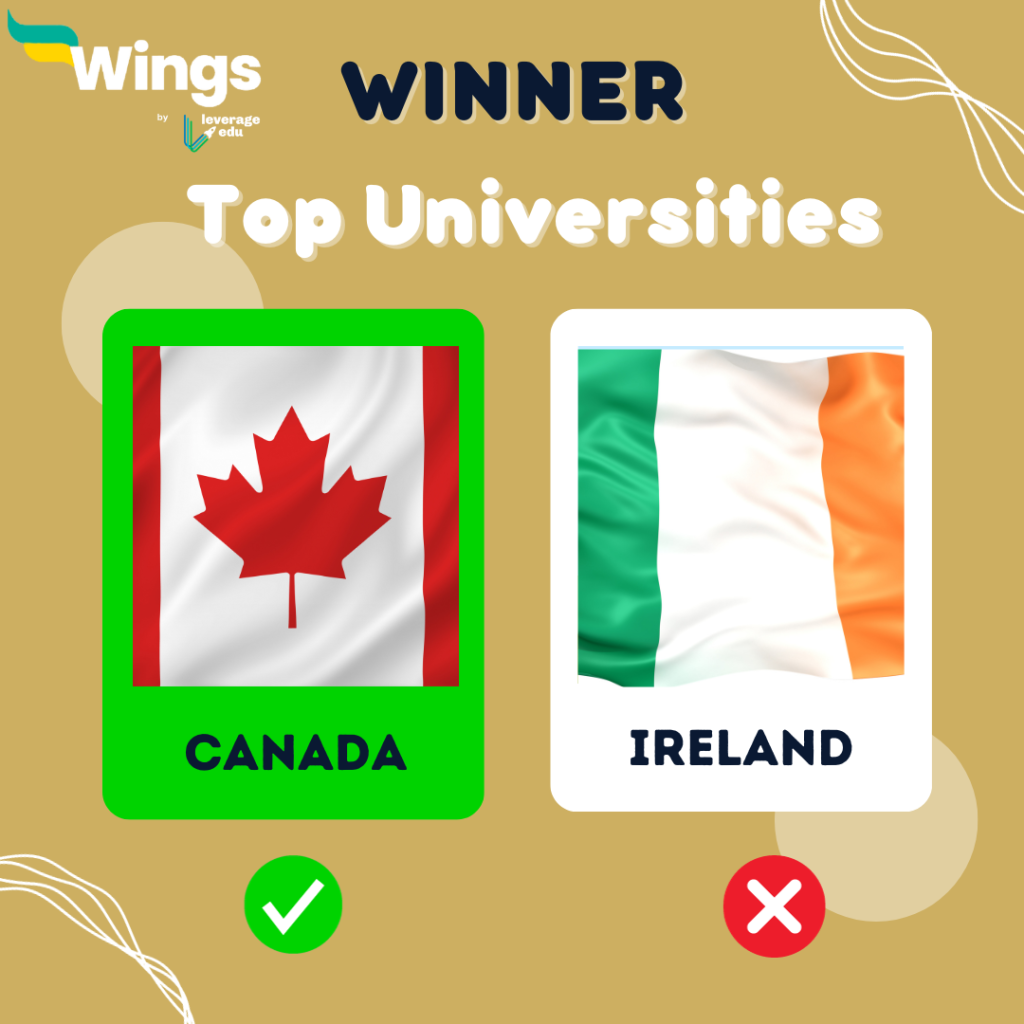
Also Read: Best Universities in Ireland
Admission Requirements
If you decide to pursue a degree in Canada or Ireland, you need to carefully review the requirements in each country. We will be looking at the admission requirements for the universities in each of the countries in this section.
Admission Requirements For Canada
The following are the qualifying requirements for studying at Canadian universities:
- The student needs to score at least 70% marks in the Class 12 exam.
- The applicants need to provide English language proficiency test scores like IELTS (6.5 overall with no bands less than 6).
- The students need to have a 4 years bachelor’s degree, 70% average (for postgraduation).
- The applicants also need to provide the following documents:
- Statement of purpose (SOP),
- Some universities may require written samples/copies of published work/Portfolio, and
- Letter of recommendation (LOR)
- One must also have up to 3 years of full-time work experience and GMAT: 580-600 min (for postgraduation).
- Depending on your citizenship, the students may require an eTA or a visitor visa, as well as a study permit.
Admission Requirements For Ireland
The following are the qualifying requirements for studying at Irish universities:
- Students must have a minimum IELTS score of 6.0, a TOEFL iBT score of 90, a PTE score of 36 (UG), a PTE score of 63 (PG), and a Cambridge ESOL score of C1 or C2.
- Applicants must have a valid passport.
- They must also be able to show confirmation of sufficient funds.
- Students must have a medical insurance policy with a minimum value of €25,000.
- You must also give certain required documents, such as:
- Two passport photographs
- A letter confirming your acceptance to a college.
- Receipt as proof of enrollment and tuition costs paid
- Additional university-specified prerequisites
Which Country is Better?
Although the admission requirements are mostly the same, the acceptance rate of universities in Ireland is much more than in Canada. Hence, we will grant +2 points to Ireland in this round of our Canada vs Ireland contest.
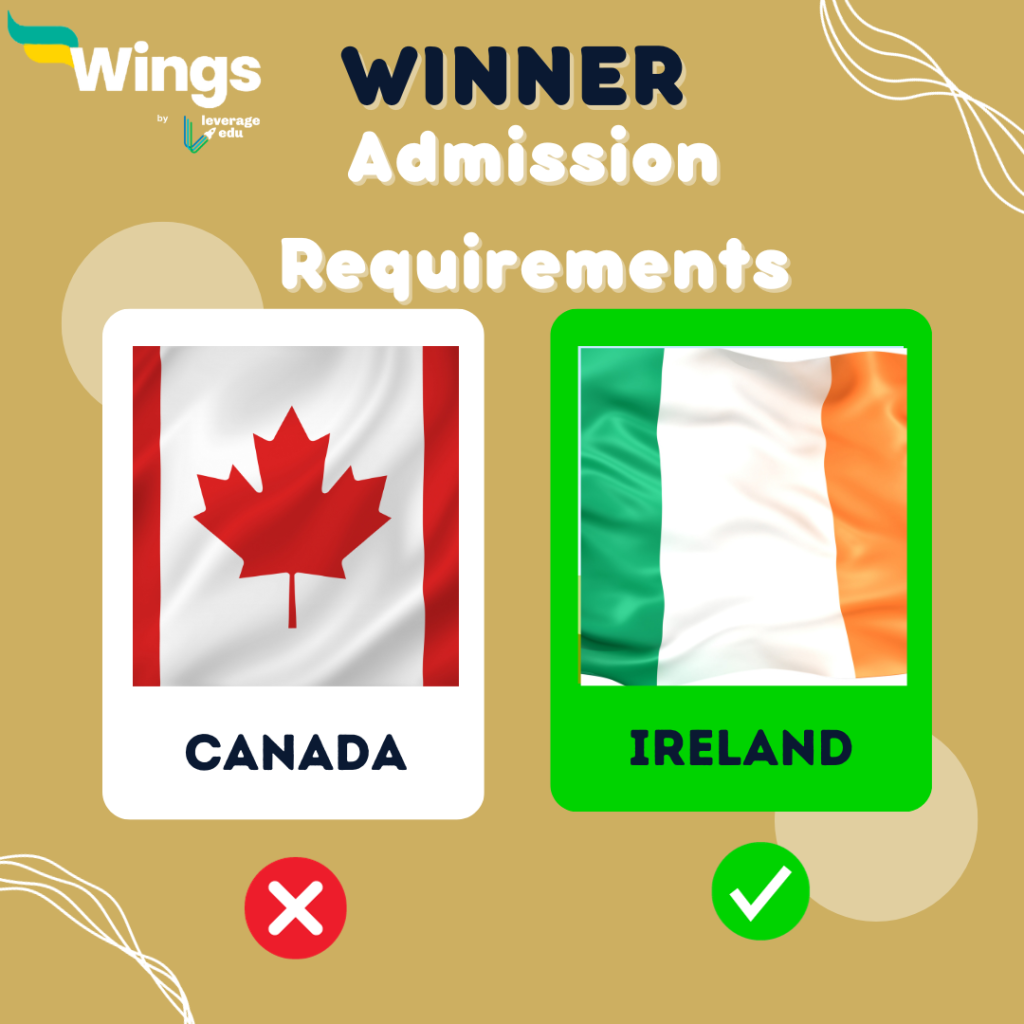
Also Read: MBA in Ireland
Tuition Fees
In this section, we will discover which country offers a lower cost of studying. The country with the lowest cost of education will receive +2 points. So, let’s compare tuition fees in Canada with Ireland.
Tuition Fees in Canada
According to the websites of the universities in Canada, the average tuition fees in the country are as follows:
| Study Program | Average Annual Tuition Fee |
| Undergraduate | CA$36,100 |
| Postgraduate | CA$21,100 |
| Doctoral | CA$4,000 – 8000 CAD/year |
Tuition Fees in Ireland
According to the websites of the universities in Ireland, the average tuition fees in the country are as follows:
| Study Program | Average Annual Tuition Fee |
| Undergraduate | €9,000 to €26,000 |
| Postgraduate | €9,000 to €35,000 |
| Doctoral | €9,000 to €40,000 |
Which Country is Better?
The overall education expense is lower in Ireland when compared to Canada. Hence, Ireland receives +2 points in this section of our Canada vs Ireland contest.
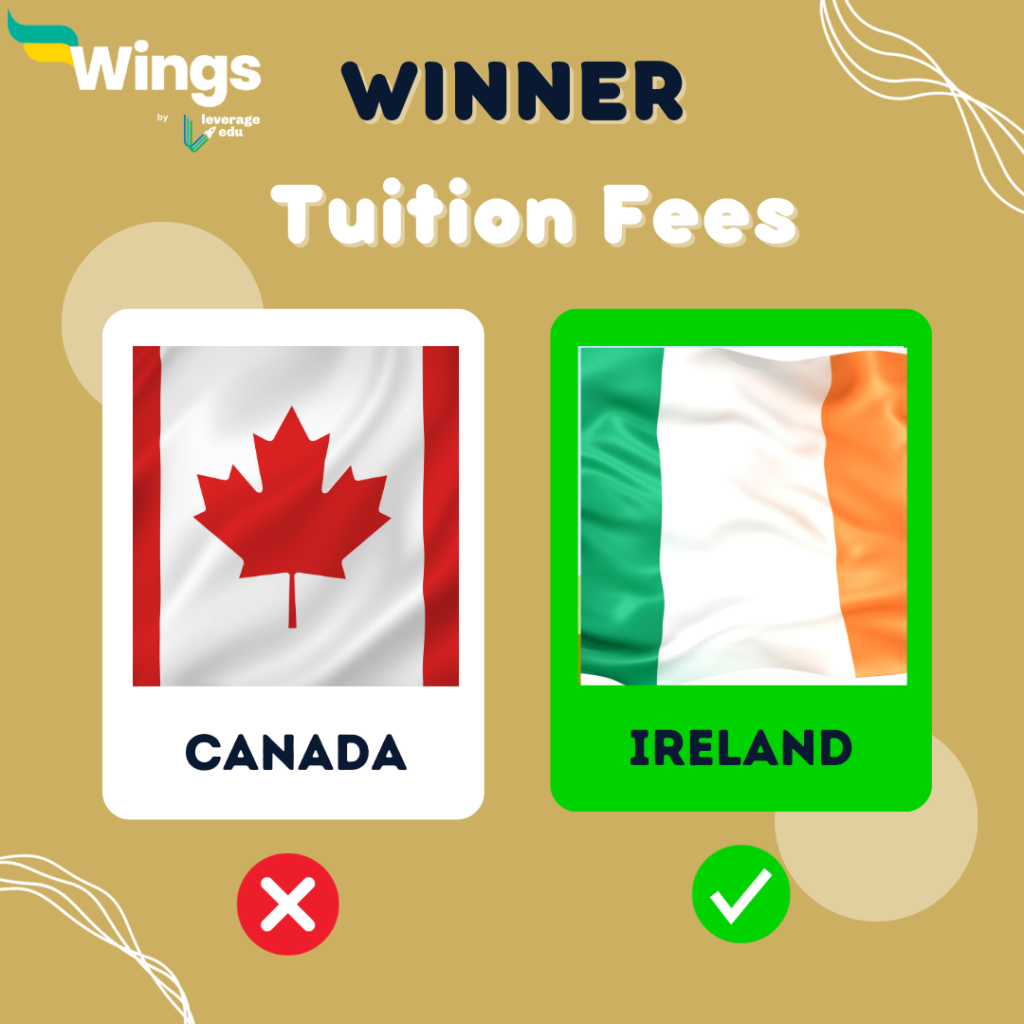
Also Read: MS in Ireland
Living Expenses
Living expenses are a major consideration when selecting a study-abroad destination. Let us compare the cost of living in Canada and Ireland to see which country is less expensive.
Cost of Living in Canada
This is what the cost of living in Canada as per Numbeo:
| Monthly Rent | CA$1,455.77 – CA$2,733.47 |
| Average Apartment Price (Price per Square Metre) | CA$6,594.63 – CA$9,209.58 |
| Average Cost of an Inexpensive Restaurant Meal | CA$22 |
| Average Transportation Cost (Monthly) | CA$100 |
| Average Cost of Utility (Monthly) | CA$342.39 |
Cost of Living in Ireland
This is what the cost of living in Ireland as per Numbeo:
| Monthly Rent | €1,240.15 – €2,483.62 |
| Average Apartment Price (Price per Square Metre) | €3,454 – €4,765.23 |
| Average Cost of an Inexpensive Restaurant Meal | €15 |
| Average Transportation Cost (Monthly) | €100 |
| Average Cost of Utility (Monthly) | €276.21 |
Which Country is Better?
As we can see, the living expense is higher in Canada when compared to Ireland. Hence, Ireland will receive +2 points in this section of our Canada vs Ireland contest for having a lower cost of living.
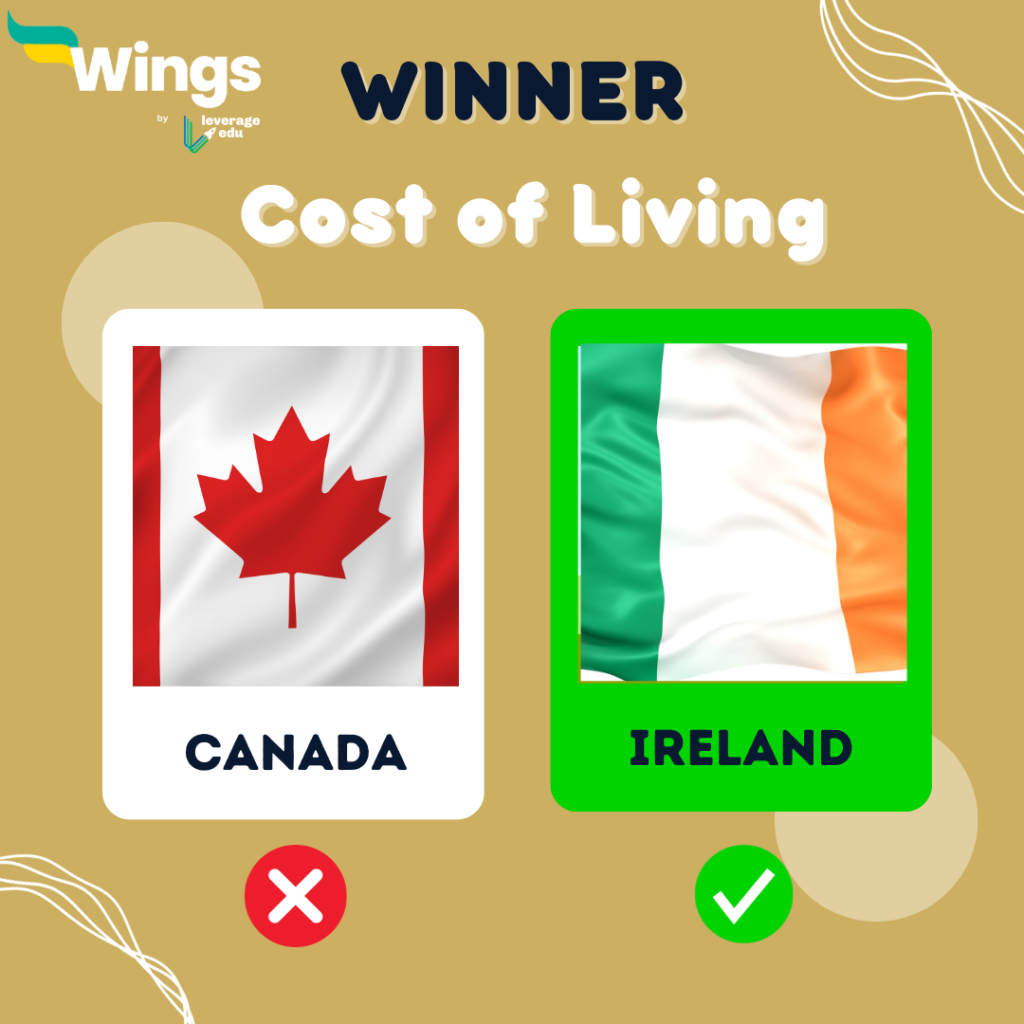
Also Read: Best Countries to Study Abroad
Work Permit and PR
Students frequently study abroad with the hope of finding work and eventually obtaining permanent residency. Let us compare the ease of obtaining a work visa and permanent residency in Canada with Ireland.
Work Permit in Canada
Let’s see how a work permit is granted in Canada:
Eligibility for a Work Permit in Canada
In order to be deemed eligible for a work permit in Canada, the applicant must have:
- Minimum of 2 years of work experience,
- Valid job offer letter issued by a Canadian employer with a positive LMIA,
- 67 points in Canada points calculator,
- Academic credentials,
- ECA report, and
- CLB score 5/ IELTS – 6.5.
How to Apply for a Work Permit in Canada
Follow these steps to apply for a work permit in Canada:
Step 1: Get your ECA and gather the checklist of requirements.
2nd Step: Go to the official website of the Canadian government, and apply for the work permit online.
Step 3: Finally, work and settle in Canada.
The processing time for the Canada Work Permit varies from 5 to 6 months for overseas applicants.
PR in Canada
The Canada PR visa typically takes 6 to 8 months to process. However, the processing period is determined by the program in which you submitted your application. For example, if you apply through the CEC program, it will be processed within three to four months.
Work Permit in Ireland
Let’s see how a work permit is granted in Ireland:
Eligibility for a Work Permit in Ireland
Those who are qualified for an Ireland Work Permit must meet the following requirements:
- The candidate should be employed on a contract basis. They may also receive a proposal from an Irish firm.
- If the candidate is applying for a work visa (other than a Critical Skills Employment visa), the employer must meet the Labour Markets Needs Test.
- This test confirms that the employer of Irish descent was unable to fill the open post with a qualified Irish or EU/EEA/Swiss citizen.
- Candidates must have an annual salary of at least €30,000 or €80,000 to be eligible for a Critical Skills Employment Permit. This is determined by the type of work they are looking for.
- Applicants for General Work Permits must have a minimum annual income of €30,000.
- Except for the Critical Skills Employment Permit and the General Employment Permit, the minimum yearly wage must meet the National Minimum Wage.
- The Irish-based company that hires the work visa applicant must employ at least 50% of its workforce from the EU, EEA, or Switzerland.
How to Apply for a Work Permit in Ireland
The first step in applying for an Ireland work visa is determining which type of work permit is desired. The candidate must complete the corresponding application form after deciding on the type of work permit required. While waiting for an update on the status of their work visa in Ireland, applicants must be patient.
The processing time for an Ireland work permit is approximately 13 weeks. Go to the DBEI website to check the status of your work visa for Ireland. You can use this website to check the status of your visa in Ireland. Once Ireland’s visa status has been accepted, you can pick up your visa.
PR in Ireland
Your personal circumstances will determine if you are eligible for permanent residency in Ireland. If you are a non-EEA national who has been legally residing in Ireland for 5 years in a row and has an employment permit, you are most likely eligible for permanent residence in Ireland.
Which Country is Better?
As per the comparison done above, getting a work permit and permanent residency in Canada is easier than in Ireland. Hence, we will grant a score of +2 to Canada in this section of our Canada vs Ireland contest.
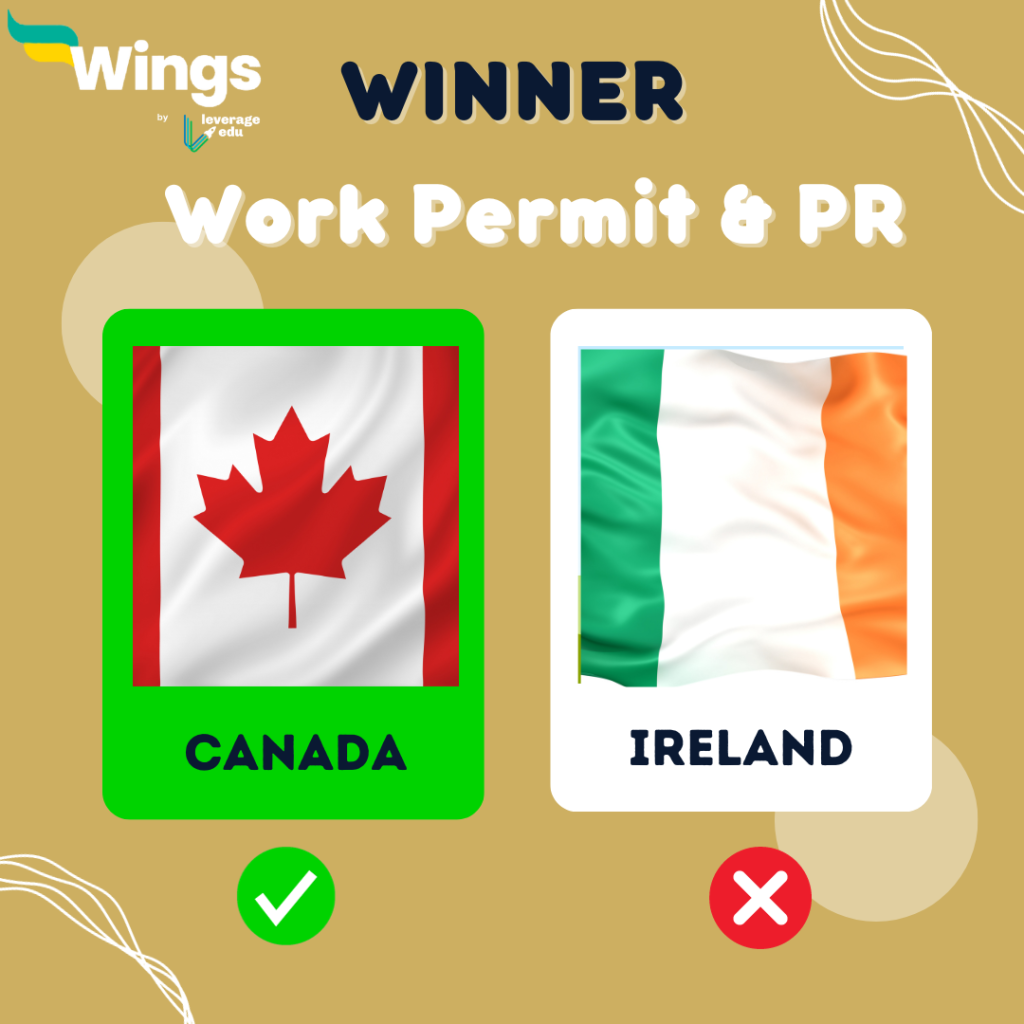
Also Read: How To Choose The Right Study Abroad Destination
Average Salaries: Canada vs Ireland
The average salary in Canada after graduation is CA$75,362 per year according to Talent.com. Entry-level positions start at a salary of CA$52,457 per annum, while most experienced workers earn up to CA$131,645 per year. On the other hand, the average annual pay after graduation in Ireland is €33,383, whereas it is €65,000 after postgraduation.
Which Country is Better?
As we can see, the average annual salary in Canada is more than in Ireland. Hence, we will give +2 points to Canada in this section of our Canada vs Ireland contest.
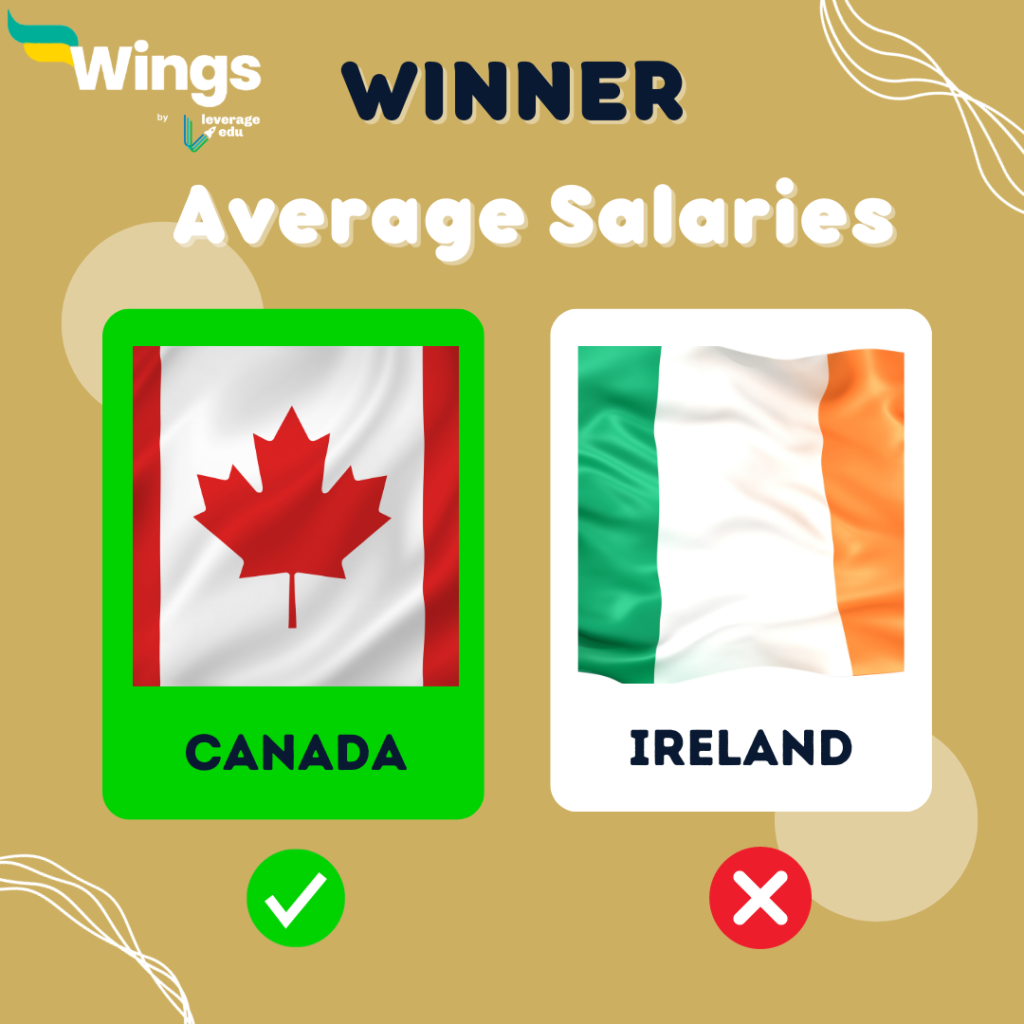
Also Read: Benefits and Scope of a Masters in Marketing in Canada
Other Major Elements
Let’s have a look at some of the other main factors to consider while picking where to study abroad. These are the critical factors:
Climate
The weather in Canada varies greatly based on location. Canada has five time zones and ranges from the Pacific to the Atlantic. Winter in Toronto is warmer than in most Canadian cities, yet it is still cold and snowy. Montreal’s winter weather is chilly and snowy. Summers in the country are usually pleasant and cool.
Coming to Ireland, the Atlantic Ocean has a strong influence on its climate, therefore warm ocean currents keep temperatures temperate. The average temperature in the spring and summer (May to July) is between 17°C and 20°C. The temperature ranges from 13°C and 17°C during the autumn season (August to October), with September being a moderate month with a sunny and warm atmosphere. The temperature in winter (November to March commencement) reaches 7.78°C, with January and February being the coldest months. Snow is uncommon in Ireland, with the exception of a few chilly periods.
Safety
In the 2018 Global Peace Index, Canada was ranked sixth among safer countries. International students can use apps and shuttles. Safe walk programs are also available for night shift classes in the country.
On the other hand, Ireland is ranked 12th in the Global Peace Index for top safe countries. The country has low crime rates, and on-campus security 24 hours a day, seven days a week.
Culture for International Students
Ireland offers a thriving social scene, with several chances for students to participate in cultural activities and social events. However, living expenses can be considerable, and work opportunities for students may be more limited than in Canada.
Also Read: ADB-Japan Scholarship Program for Developing Countries
Conclusion
When we tally up Canada’s and Ireland’s scores, we notice that both Canada and Ireland received 6 points. As a result, this match is a draw.
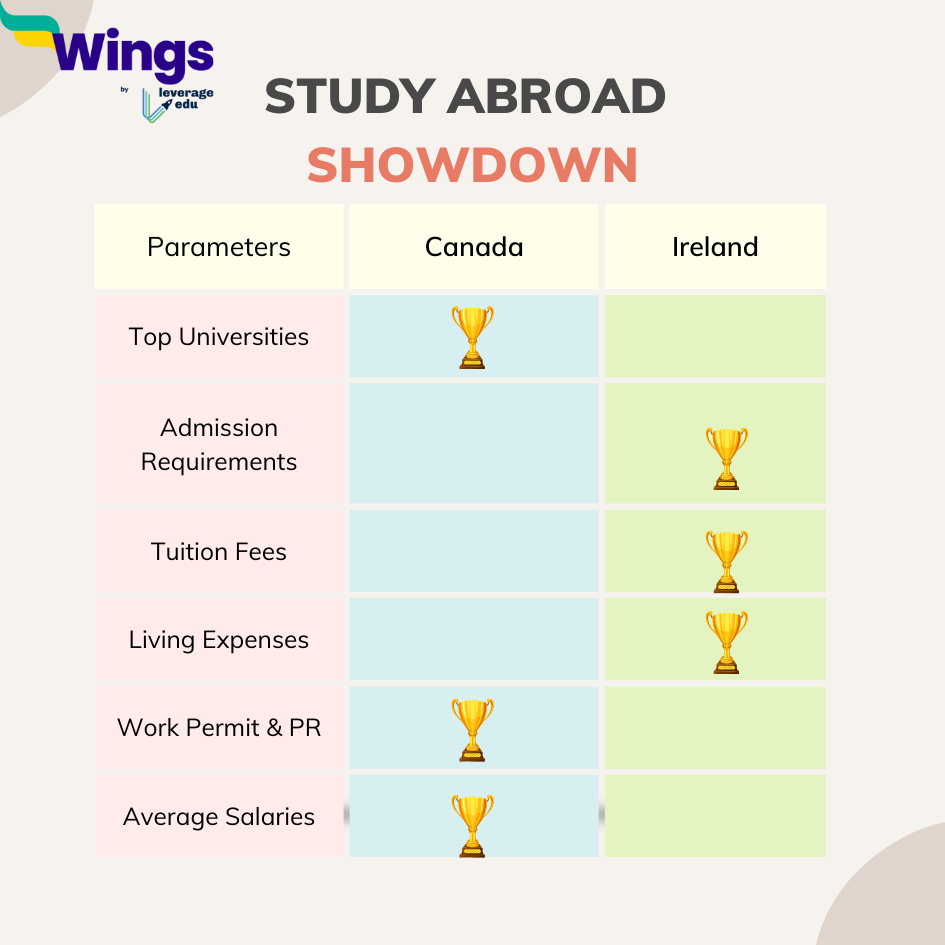
Keep in mind that choosing between Canada and Ireland is tough because each has specific advantages and disadvantages. Before making a decision based on the availability of educational facilities and general financial support in the two countries, it is preferable to first choose a course or area of study.
As a consequence, you’ll make a more educated selection. Having said that, both Canada and Ireland are outstanding study-abroad locations with promising futures for individuals who study in these countries.
Also Read: Masters in Biochemistry in Canada: Top Colleges, Fees, Scholarships, Scope
FAQs
Ans. Ireland is an excellent choice for international students. It offers a great education system, world-class colleges, and numerous job opportunities. Ireland is also extremely safe, having extremely low crime rates. As a result, Ireland is a popular choice for overseas students.
Ans. In Canada, you will discover a great standard of living. International students enjoy the same rights and liberties as other Canadians.
Ans. Obtaining a permanent residency visa in Canada is simple. This is due to the fact that there are multiple immigration paths to Canadian permanent residency for individuals. This gives customers the freedom to select the most suited curriculum for their situation.
So, this was all about Canada vs Ireland. Many Indian students dream of pursuing education in foreign nations due to the exposure and career growth they offer. Consider joining a free counselling session with Leverage Edu if you plan to study abroad.


 One app for all your study abroad needs
One app for all your study abroad needs











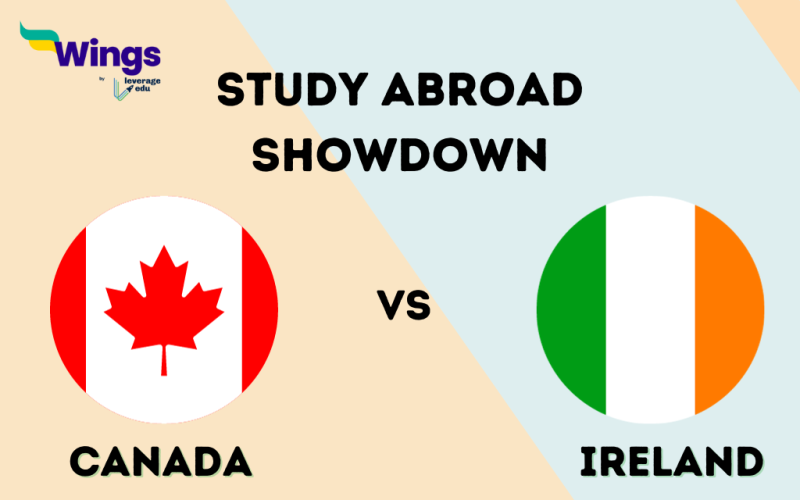
 60,000+ students trusted us with their dreams. Take the first step today!
60,000+ students trusted us with their dreams. Take the first step today!